In Denmark, where I grew up, state and church are not separate. There is a government department for the Protestant Church and classes in religion in the schools.
My mother told me how she as a young girl in school suddenly realized: “This is all old wives’ tales!” She became a scientist and she didn’t give thought to the mysteries that science could not explain. In fact my whole family is more or less allergic to religion and they seem to live quite happily with this attitude.
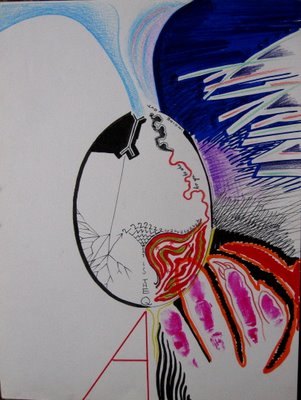
I had different feelings. As I got older I had an urge to understand more and I began to search for a deeper truth than science offered. Often I speculated about a divine force and the ways different religions perceived it. I found organized religions suspect because of their claim to universality, their dogmatism and their ties to money and power.
The Western religions seem to be always in conflict with science because they claim their scriptures as the absolute truth. Only the mystics transcend the written word, but the religious establishments usually have persecuted them. Jesus was a mystic, but they killed him and garbled his message.
The Eastern religions are different. They steer clear of conflict with science because they do not cling to their scriptures as absolute truth. When the venerable Kalu Rimpoche was asked if he thought the earth is flat, as some Buddhist scriptures maintain, he answered with a smile: “When I was flying here I looked out the window and the earth looked flat to me.” He didn’t gainsay the scriptures, but he didn’t deny the dictum of science either. The humor in his answer conveyed that the question is of minor importance to a Buddhist. Whether the earth is round or flat, whether the universe is limitless or not, it doesn’t matter to the real concern, which is to find inner peace and clarity.
The Eastern religions actually agree with modern physics on the deepest levels. ”Form is no other than emptiness and emptiness is no other than form,” said the Buddha. This emptiness, that in Buddhism is considered the ultimate truth, is not ‘nothingness’. You could say it is a formlessness that contains all forms. I call it The Great Spirit.
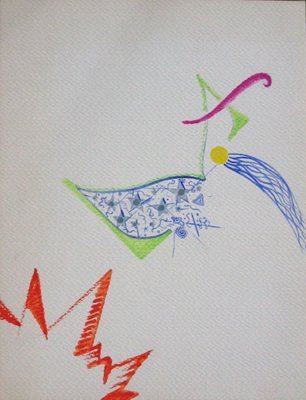
Where is the link between the Great Spirit and science?
The latest scientific theory, which unifies Einstein’s Theory of Relativity with Quantum Mechanics, is called String Theory. It says that all the different subatomic particles consist of the same tiny strings of energy and that it is their different vibrations that make them behave like different particles.
Some scientists say that this is not science any more because there seem to be no way of testing it. They say it is philosophy. Whether it is one or the other, I believe that this string energy is the manifestation of the Great Spirit, so that all energy and matter (as I already said
here) essentially consist of Spirit.
Spirit is a total mystery but since it is the essence of our being, I believe that we can experience it. This experience is at the center of all religions. About it Joseph Campbell says:
…an experience that is regarded by those that have known it as the apogee of their lives, and which is yet ineffable*. And this experience, or at least an approach to it, is the ultimate aim of all religion, the ultimate reference of all myth and rite. Moreover, those by whom the mythological traditions have been developed and maintained have been the shamans, sages, prophets, and priests, many of whom have had an actual experience of this ineffable mystery and all of whom have revered it. One of the ironies …… is that much of the research and collecting among primitive tribes has been conducted either by scientists whose minds are sterilized to this experience and for whom the word “mystic” is a term of abuse, or else by missionaries for whom the only valid approach to it is in their own tradition of spiritual metaphor.*ineffable = beyond words
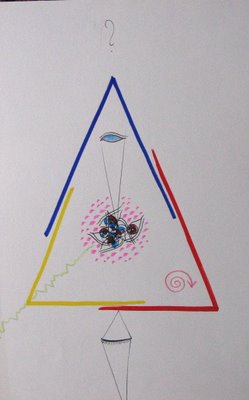
The art is unrelated to the text except as expression of the mystery!


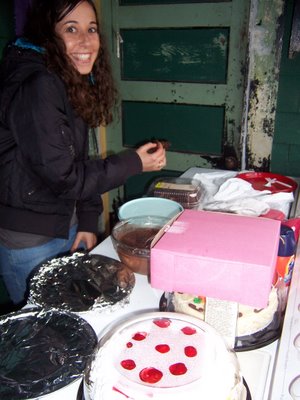





 One wintry Sunday we took the S-train up north to take a walk around a lake. Trunte did not often get out like this, and she took off. Before we were half way round the lake we had lost her. When we came back to the station we asked for her and they found out that she was in Holte, the end of the line. She must have found our trail, but followed it the wrong way, back to the station. There she remembered that we came with a train on the north going track, so, when a train arrived she entered it and was taken on to the end of the line. There, of course, she was confused and the personnel noticed her and send word down the line.
One wintry Sunday we took the S-train up north to take a walk around a lake. Trunte did not often get out like this, and she took off. Before we were half way round the lake we had lost her. When we came back to the station we asked for her and they found out that she was in Holte, the end of the line. She must have found our trail, but followed it the wrong way, back to the station. There she remembered that we came with a train on the north going track, so, when a train arrived she entered it and was taken on to the end of the line. There, of course, she was confused and the personnel noticed her and send word down the line.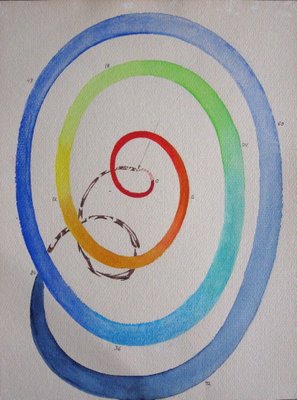 The arrow points to the moment of conception. The infra red represents the nine months in the womb and then come the different ages with their colors: early childhood - red, late childhood - orange, teenage years - yellow into green, youth - green maturing into blue and so on. This particular life ends at 84 and ultra violet reprsents the afterlife.
The arrow points to the moment of conception. The infra red represents the nine months in the womb and then come the different ages with their colors: early childhood - red, late childhood - orange, teenage years - yellow into green, youth - green maturing into blue and so on. This particular life ends at 84 and ultra violet reprsents the afterlife.
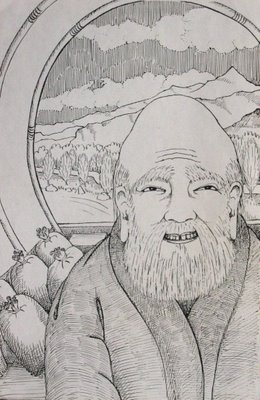
 My two best friends were the tallest guys in the company and I was only 5’7”. We always managed to form the front row when we were marching, me in the middle with a towering guy on each side. The officers didn’t like the looks of it but there seemed to be no rule against it, so it couldn’t be stopped. Otherwise there were rules for most occurrences and the game was to bend the rules or break them without getting caught. Because I was an engineer I was potential officer material, but I think they sensed that it would not work. The lieutenant colonel also needed some people with the smarts to calculate the directions of the canons. With my friend Svend I became calculator for the two batteries as a whole, which meant that no shot could be fired before we had verified the calculations for each battery. That gave us a measure of power.
My two best friends were the tallest guys in the company and I was only 5’7”. We always managed to form the front row when we were marching, me in the middle with a towering guy on each side. The officers didn’t like the looks of it but there seemed to be no rule against it, so it couldn’t be stopped. Otherwise there were rules for most occurrences and the game was to bend the rules or break them without getting caught. Because I was an engineer I was potential officer material, but I think they sensed that it would not work. The lieutenant colonel also needed some people with the smarts to calculate the directions of the canons. With my friend Svend I became calculator for the two batteries as a whole, which meant that no shot could be fired before we had verified the calculations for each battery. That gave us a measure of power.  My most daring rule breaking occurred once after I was at the infirmary with the flu. I discovered that when you were discharged you were given a form with the date and the doctor’s signature that you had to show to your commanding officer. In the interval from you left the infirmary till you arrived at the barracks you were beyond military control. If I stretched that interval who would know? All I needed was another form with a later date. As I was good at forging it would not be a problem to fill in a blank form with the doctor’s signature and a new date. In an unguarded moment I took a blank form from the doctors office and when I was discharged I took the train home to Copenhagen where I enjoyed a couple of days of freedom. On the train back I saw one of our officers, but I bent down when he passed and he didn’t see me. When I arrived back everybody was upset because the lieutenant colonel had asked for me and said he would visit me at the infirmary. The danger had passed, but I had a moment of anguish when I was told to give the form to the doctor next morning. He was the one person that surely would become aware of the forgery. I decided to ‘forget’ to give him the form, and nobody ever noticed.
My most daring rule breaking occurred once after I was at the infirmary with the flu. I discovered that when you were discharged you were given a form with the date and the doctor’s signature that you had to show to your commanding officer. In the interval from you left the infirmary till you arrived at the barracks you were beyond military control. If I stretched that interval who would know? All I needed was another form with a later date. As I was good at forging it would not be a problem to fill in a blank form with the doctor’s signature and a new date. In an unguarded moment I took a blank form from the doctors office and when I was discharged I took the train home to Copenhagen where I enjoyed a couple of days of freedom. On the train back I saw one of our officers, but I bent down when he passed and he didn’t see me. When I arrived back everybody was upset because the lieutenant colonel had asked for me and said he would visit me at the infirmary. The danger had passed, but I had a moment of anguish when I was told to give the form to the doctor next morning. He was the one person that surely would become aware of the forgery. I decided to ‘forget’ to give him the form, and nobody ever noticed.
 I had different feelings. As I got older I had an urge to understand more and I began to search for a deeper truth than science offered. Often I speculated about a divine force and the ways different religions perceived it. I found organized religions suspect because of their claim to universality, their dogmatism and their ties to money and power.
I had different feelings. As I got older I had an urge to understand more and I began to search for a deeper truth than science offered. Often I speculated about a divine force and the ways different religions perceived it. I found organized religions suspect because of their claim to universality, their dogmatism and their ties to money and power. Where is the link between the Great Spirit and science?
Where is the link between the Great Spirit and science? The art is unrelated to the text except as expression of the mystery!
The art is unrelated to the text except as expression of the mystery!
 When it began to get dark we got up. A flute began to play nearby, and I knew that we had been observed.
When it began to get dark we got up. A flute began to play nearby, and I knew that we had been observed. Temptations
Temptations The kiss of judas.
The kiss of judas.
 Lao Zi cultivated the Way and Virtue and his teaching aimed at selflessness and no name. For a long time he lived in Zhou, but when he saw its decline he left.
Lao Zi cultivated the Way and Virtue and his teaching aimed at selflessness and no name. For a long time he lived in Zhou, but when he saw its decline he left.